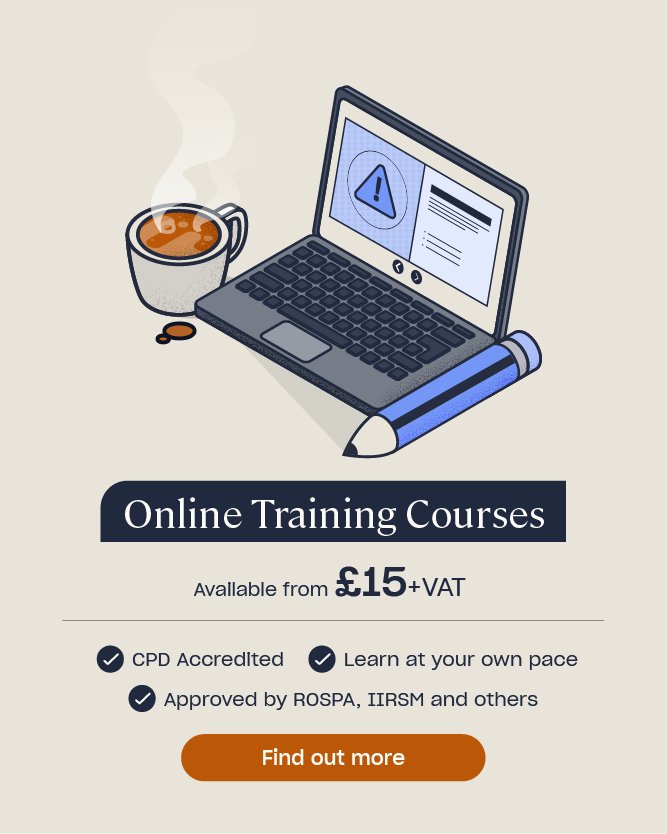Vegan Food Report: Beyond the Label
Do current vegan labelling laws pose a threat to food allergy sufferers, and how does this impact the future of plant-based products?
Although the term ‘vegan’ is relatively new and was defined as late as the 1940s, the popularity of this lifestyle has significantly grown in recent years. The number of people following a vegan diet has seen an increase of 300% between 2006 and 2018. Presently, it is estimated that between 2-3% of the UK population follows a vegan lifestyle. Interestingly it’s not just vegans who purchase vegan products. Research suggests that 1 in 5 UK shoppers buy food labelled as vegan or plant-based at least once a week.
The general perception of vegan food is that it does not contain any animal-derived ingredients such as eggs and milk, that are also allergens. However, despite its increasing popularity there is still no legal definition for vegan food. Consequently, products labelled as vegan can still contain ingredients derived from animals.

High Speed Training is a leading online course provider, recognised for its training on food safety and allergen awareness. This report aims to shed light on perceptions regarding what should or should not be included in vegan food and to understand the level of confidence in existing food testing methods. Additionally it aims to raise awareness about the absence of a definition for vegan food and how this could potentially pose risks to people with food allergies due to widespread misunderstanding.
Overview of YouGov Survey
Conducted in January 2024 the YouGov survey, commissioned by High Speed Training, provides insights into opinions and misconceptions surrounding vegan food and its relation to food allergies. This survey plays a role in our report as we explore the need for a clear legal definition of vegan food.
The survey involved 2,187 participants from demographics across the United Kingdom. The participant breakdown was diverse consisting of 48% male and 52% female respondents spanning the following age groups.
- 11% aged 18-24 years
- 16% aged 25-34 years
- 18% aged 35-44 years
- 17% aged 45-54 years
- 38% aged 55+ years
The first question of our survey asked participants whether they identified as vegan and if they had any allergies to milk, eggs, fish, crustaceans or molluscs. This question plays an important role in understanding the number of people who might be at risk due to misconceptions about allergens in vegan food.
In question two we explored each participant’s understanding of what they believe qualifies as vegan food and whether they expected animal-derived ingredients such as milk, eggs, fish, crustaceans or molluscs to be present in vegan food. The responses to this question help paint a picture of how the UK population comprehends the allergy risks associated with vegan food due to the absence of a legal definition.
The third question assessed confidence in methods used for testing food. People’s answers provided insights into their level of trust regarding whether the food they consume matches its description. Finally, the fourth question directly asked participants if they believed having a definition for vegan food was necessary. This question is crucial for our report because it reflects the public’s opinion on establishing a definition of vegan food.
In general, the data from our YouGov survey provides insights into how the public perceives and understands vegan food and its relationship with food allergies. The findings will contribute to our report on the necessity of having a definition for vegan food and improved testing in the food supply chain.
Analysis of Survey Results
Public Perception of Vegan Food
Based on our YouGov survey results 72% of all participants believe that vegan food does not contain any ingredients derived from animals, making it safe for individuals with allergies to allergens such as milk, eggs, fish, crustaceans or molluscs. This belief was consistent across groups including vegans, non-vegans and people with food allergies. Focusing specifically on participants with food allergies, the percentage increased to 75% indicating that they also perceive vegan food as safe for consumption if you are allergic to animal-derived allergens, which is concerning to see. Looking just at the responses from vegans (with and without allergies) there is a better understanding but still a high number, 64%, believe that vegan food would not contain ingredients derived from animals.
Survey participants were asked. Which ONE, if any, of the following statements do you agree with?
- Vegan food can contain animal-derived ingredients (such as milk, eggs, fish, crustaceans or molluscs) and may be unsafe for people who are allergic to those ingredients.
- Vegan food does not contain animal-derived ingredients (such as milk, eggs, fish, crustaceans or molluscs) and is safe for people who are allergic to those ingredients.
- Don’t know.
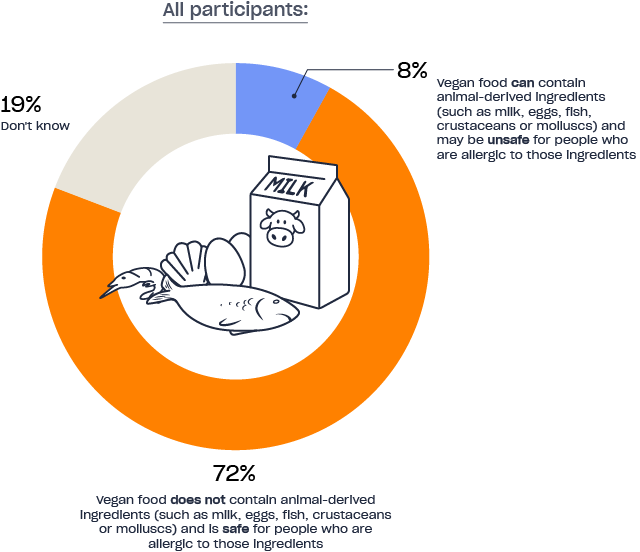
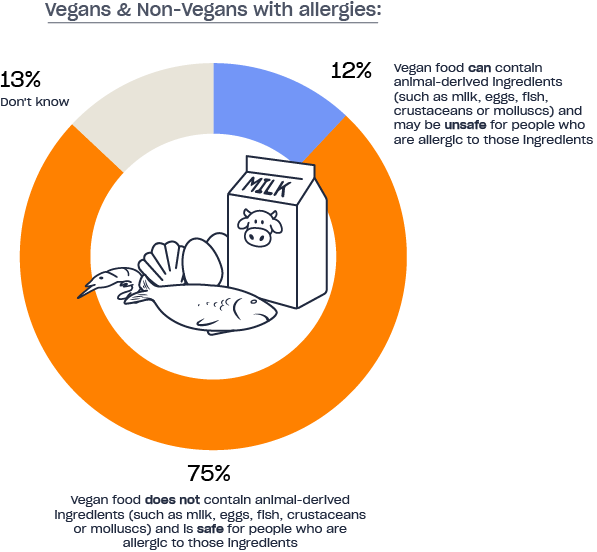
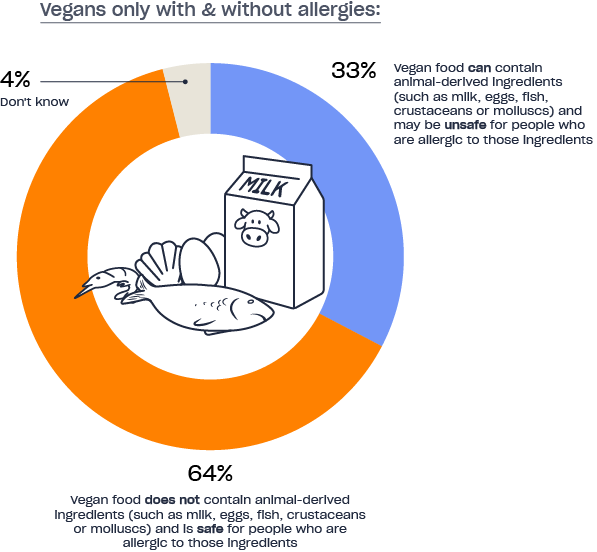
Only 8% (about 1 in 12 people) of all survey participants recognised the potential risk of allergen contamination in vegan food. Among vegans (with and without allergies), this awareness was higher at 33% indicating some level of understanding within the vegan community. However, it is surprising that just one out of three vegans are aware.
These responses highlight a concerning misconception. While the term ‘vegan’ generally implies that products do not contain ingredients sourced from animals, the reality of food manufacturing processes can lead to the presence of allergens in vegan products. For instance, cross-contamination or shared production facilities can potentially result in trace amounts of milk, eggs, fish, crustaceans or molluscs being found in vegan foods.
This lack of awareness has implications. For the consumer, it may lead to misguided choices, particularly for those who seek to avoid animal products due to ethical or environmental reasons. Moreover, it poses potential risks for individuals with allergies who might consume products that are vegan believing they do not contain allergens like milk, fish, crustaceans or molluscs.
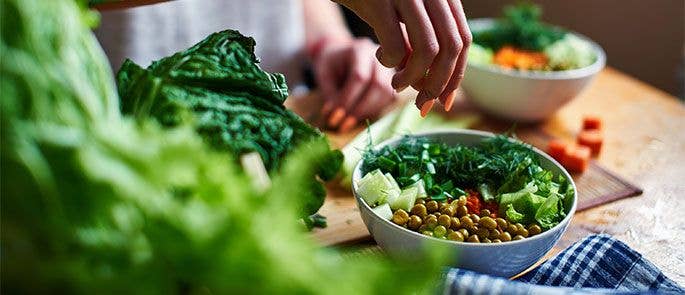
Confidence in Food Testing
Considering the serious questions raised about food testing and labelling, our YouGov survey asked the UK public about their confidence in current food testing methods that are there to ensure the food we eat is as described.
Survey participants were asked. In general, to what extent, are you confident in current food testing methods to ensure the food you eat is as described?
- Very confident.
- Somewhat confident.
- Not very confident.
- Not at all confident.
- Don’t know.
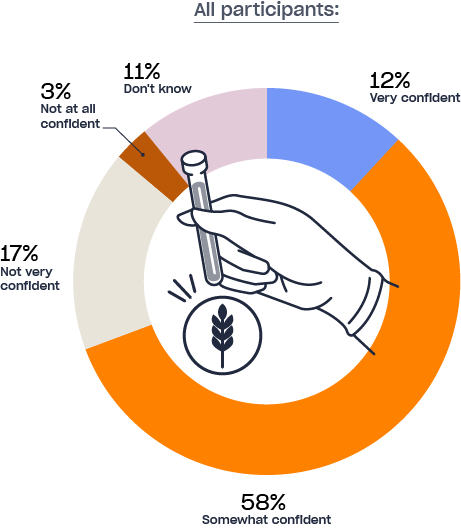
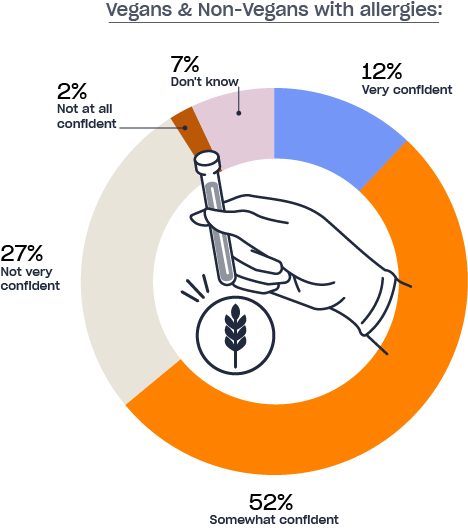
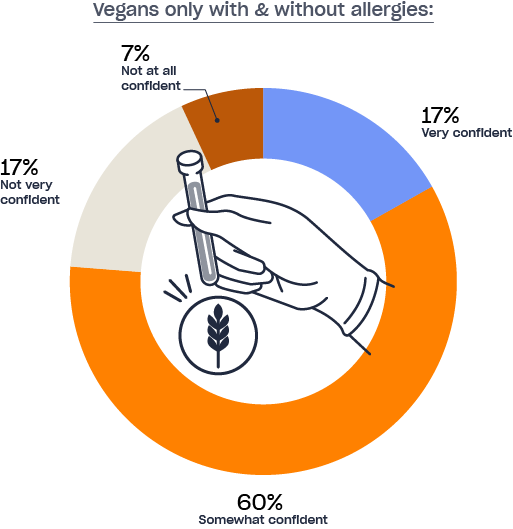
Based on the findings of our survey it is evident that there is a mix of confidence among the public. In general, 70% of the participants expressed some level of confidence with 12% being ‘Very confident’ and 58% ‘Somewhat confident’ in the testing methods. However, when it comes to individuals with food allergies this confidence drops to 64%, and those not confident in food testing methods increases from 20% for everyone to 29% for those with allergies.
These results indicate that while a majority still have trust in the existing food testing systems it is understandable that people with allergies are cautiously sceptical.
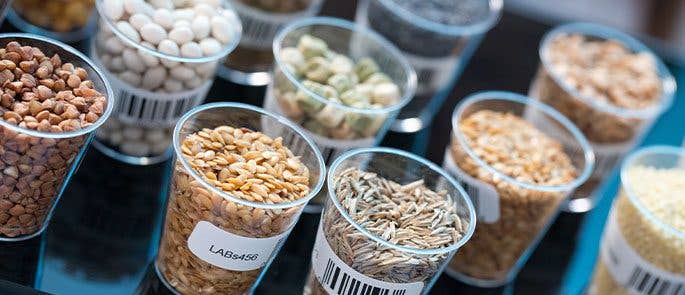
Need for Legal Definition
A majority, 75% or three out of four survey participants, agree that having a legal definition for vegan food is crucial. This definition would clarify that vegan foods should not contain animal-derived ingredients such as eggs, milk, fish, crustaceans or molluscs. Interestingly, when looking only at survey responses from vegans the majority increases from 75% to 87%, which shows that the vegan community would welcome the introduction of a legal definition for vegan food.
Survey participants were asked. To what extent do you agree or disagree with the following statement?
“A legal definition is needed to clarify that the food labelled as vegan must not contain animal-derived ingredients such as milk, fish, crustaceans or molluscs”
- Strongly agree.
- Tend to agree.
- Neither agree nor disagree.
- Tend to disagree.
- Strongly disagree.
- Don’t know.
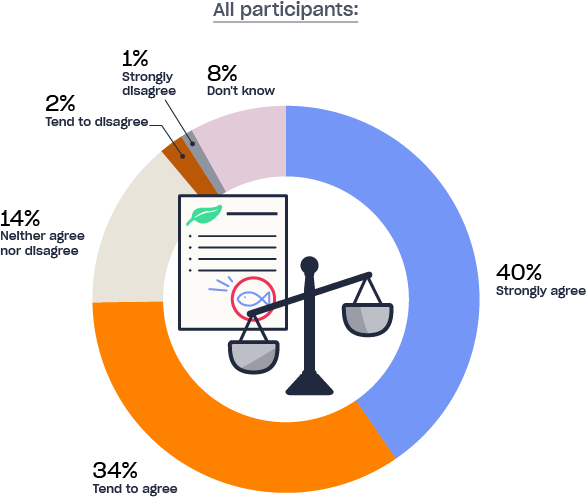
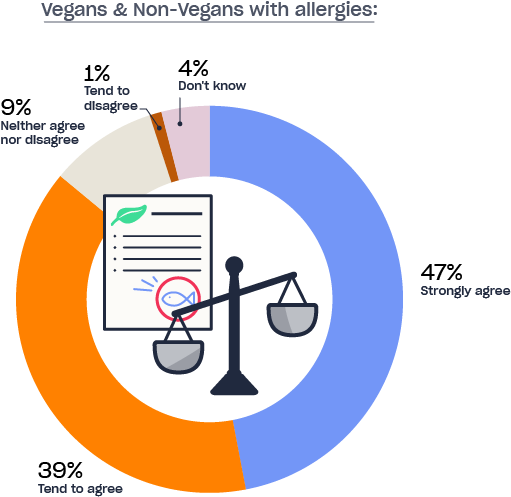
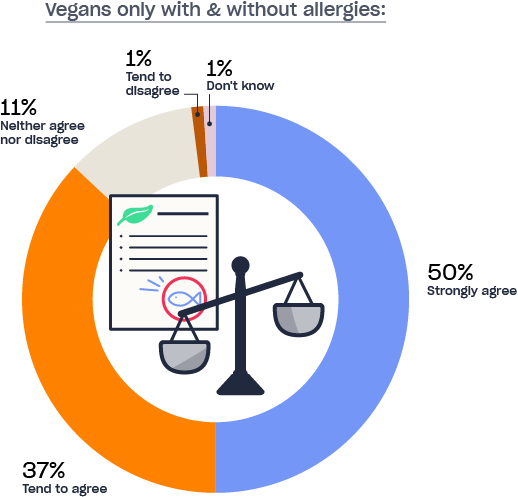
The absence of such a definition currently poses potential risks for individuals with allergies who might mistakenly assume that vegan foods are allergen-free. Furthermore, a clear legal definition would assist consumers in finding products that match their values and contribute to environmental sustainability.
By establishing a definition for vegan food, we can ensure clarity in product labelling, consumer safety and alignment with consumer preferences.
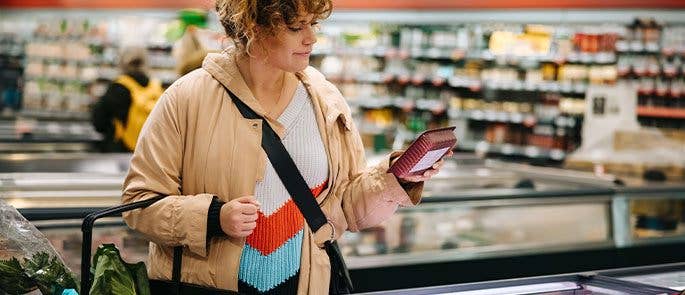
The Tragic Story of Celia Marsh
The need for a robust system to confirm the absence of allergens in ingredients and the need for a legal definition of vegan food is made all too clear in the tragic case of Celia Marsh. In December 2017, Celia Marsh, a 42 year old mother of five and dental nurse diagnosed with a cow’s milk allergy, died after eating a super-veg rainbow flatbread from Pret a Manger labelled as ‘vegan’ and ‘dairy-free’ which, unbeknownst to her, was contaminated with milk protein. This is particularly saddening as Mrs Marsh is said to have been “religious” in checking the ingredient lists on foods in an attempt to stay safe.
At the inquest into Celia Marsh’s death evidence was revealed that identified the source of the cross-contamination was a stabilising ingredient used in the dairy-free yoghurt alternative made by Planet Coconut. During the inquest, the managing director of Planet Coconut, Bethany Eaton, was asked whether she considered testing ingredients to which Mrs Eaton replied “We never tested the product because I was assured and believed it was being made in an allergen-free environment.” Mrs Eaton went on to explain that since the death of Celia Marsh, all products are now tested regardless of where they come from.
Pret a Manger had taken the word of their supplier that the ingredients used in the super-veg rainbow flatbread were dairy-free and labelled it as such. Sadly, this was not the case.
In a subsequent prevention of future deaths report, the coroner Maria Voisin concluded that “a product which is marked dairy-free should be free from dairy.” When outlining her concerns, Voisin addressed the FSA, the British Retail Consortium, Food and Drink Federation and British Hospitality, saying:
The wording used on food products, and the public’s understanding of these phrases in terms of implying the absence of a particular allergen, can be potentially misleading. Examples include: “free-from” and “vegan”. Foods labelled in this way must be free from that allergen, and there should be a robust system to confirm the absence of the relevant allergen in all ingredients and during production when making such a claim.
Maria Voisin – His Majesty’s Senior Coroner for the area of Avon
Discussing the current role and responsibilities of food manufacturers, food retailers and restaurants to protect consumers, food allergen expert Caroline Benjamin said “Food manufacturers and retailers have a responsibility under Pre-packed labelling regulations and we believe testing for precautionary allergen labelling (PAL) is a best practice in keeping the food hypersensitive (FHS) consumer safe. Restaurants need to have a full HACCP / auditing in place when making claims but also making the customer aware of any risks and how these will be mitigated when preparing food for the FHS customer.”
Since Mrs Marsh’s tragic death, there has been no change in the law to provide a legal definition of vegan food nor to introduce improved testing and checks to ensure food and its labelling accurately match. The FSA has updated its food allergen business guidance on the labelling of vegan products, recommending that a precautionary allergen label, also known as a ‘may contain’ statement, be applied to a vegan product. Although this is a small step in the right direction, the majority of what was suggested in Voisin’s prevention of future deaths report has still not been acted upon and it remains difficult for consumers to make informed choices when purchasing vegan food products. Ultimately, those with allergies are still at risk.
The Vegan Society’s Position
The Vegan Society is an established charity and the oldest organisation dedicated to promoting veganism. Founded in the UK in 1944 they lead activities and campaigns related to veganism and plant-based foods.
The Vegan Trademark is a known certification for vegan products that have gained recognition through the efforts of the Vegan Society.

According to the official ‘Vegan Trademark standards’ it mentions “The manufacture and/or development of the product, and its ingredients, must not involve or have involved the use of any animal product, by-product or derivative.”
It is important to note that the Vegan Trademark does not explicitly require vegan food to be suitable for individuals with animal-based food allergies. Instead the licence agreement asks companies to confirm that they strive to minimise cross-contamination from animal products “as far as is reasonably practicable”.
As stated by the Vegan Society themselves:
The Vegan Society does not claim that products registered with the Vegan Trademark are suitable for people with allergies to animal products; this depends on the standards achieved by individual manufacturers.
The Vegan Society
Alex Gazzola, a writer specialising in food allergies, intolerances and coeliac disease, explains this further, saying: “The definition of ‘vegan food’ according to the Vegan Society (VS) is essentially based on ingredients and intent. If the ingredients are vegan, and the intention is to make a vegan product, then it is vegan. I suppose you could say it is about the attempt made, rather than a strict measure of success. Accidental cross-contamination is not an ingredient, and not intentional, therefore has no impact on the vegan status.”
Giving his opinion on what the future of vegan labelling could look like, Alex said: “People with a milk and/or egg allergy are regular consumers of vegan foods, and have contributed to the growth in the vegan sector from which the VS have directly benefited. It would be a nice touch if they were to give something back to the community, even if just helping out with awareness campaigns.”
“I think it would be a pity and would sour relations if pressure from the allergy / free from community were to ultimately result in the VS having to change their definition against their will. What I’d like to see instead is discussion and negotiation between the communities and the legislators to reach an agreement on the best way forward”
“If a food meets the VS definition, it is vegan. If it does not, it is not. There is no ‘in between’ or third ground under the current definition. I do like the idea of a third ground, I should add – ‘vegan’ and ‘vegan plus’, for example, to take into account foods with and without potential cross-contamination”
We spoke with Chris Kirby, Health & Safety Manager at Timothy Taylor & Co. brewery, who have been granted use of the Vegan Trademark on their range of bottled and canned beers. Asked for his thoughts on the potential introduction of a legal definition of vegan foods and the impact it may have on the production of vegan products Chris said “I think there may be some negativity as some of the vegan claims that are made by manufacturers would need to be revisited and work would need to be completed on new ways to ensure their vegan status. It would not negatively impact Timothy Taylor products as our vegan products are completely segregated from non-vegan products, so therefore no cross-contamination risk.”
The term ‘vegan’ belongs to the vegan community and that community plays a key role in determining what ‘vegan’ means, but consumer expectations and industry practices do not match as 64% of vegans expect food labelled as vegan to be completely free from any ingredients derived from animals.
Chartered Trading Standards Institute’s (CTSI) Recommendation
There is a growing concern in the food industry regarding the absence of a vegan food definition. With more people buying vegan food and campaigns like Veganuary promoting vegan diets it’s crucial to address this issue.
The Chartered Trading Standards Institute (CTSI) published a report in 2023 and put forward recommendations relating to vegan and plant-based food. They highlight the need for a definition of vegan food as well as an educational campaign to help consumers understand what to look for on food labels. Additionally, they suggest that businesses should receive updated guidance to ensure transparency. Implementing these recommendations would play a role in safeguarding consumer safety and fostering trust.
Timothy Taylor & Co. Health & Safety Manager, Chris Kirby says “I feel that consumers should be able to make food safe choices about the food / drink they consume. Just because a product is Vegan doesn’t mean it is allergen-free, and this may be what some consumers presume. Vegan consumers choose not to eat products that intentionally use ingredients of animal origin, but it is equally as important to highlight to the consumer if there is a potential allergen cross-contamination risk (e.g. “may contain” statement). If a consumer is choosing to have a vegan diet, then the products should be completely vegan. Having worked in food manufacturing for the last 27 years I understand the challenges this can pose, so a legal definition would clear up any confusion.”
Currently some companies are taking advantage of people’s assumptions about vegan diets through “vegan washing.” This deceptive practice involves labelling products as “vegan” or “plant-based” despite containing animal-derived ingredients like milk or eggs or being prepared in environments where cross-contamination with animal-based products is highly likely. For example, in 2020 Burger King released their new “plant-based” burger which was widely considered to be suitable for vegans. In reality, it was found that the burger was cooked alongside meat, and the product came with egg-based mayonnaise. Thus, it wasn’t suitable for vegans and the ad was considered by the Advertising Standards Authority (ASA) to be misleading.

To prevent the occurrence of animal-derived ingredients in vegan food it would be beneficial to act on the CTSI recommendation and establish a legal definition that strictly prohibits any presence of animal-derived ingredients.
Additionally it is important to raise awareness among consumers about how animal-derived ingredients are indicated on food labels. Some terms used to describe animal-derived ingredients may not be familiar to consumers. For example:
- Casein – A milk protein.
- Collagen – From the skin, bones and elastin tissue of animals.
- Whey – A milk by-product.
- Albumen/Albumin – From egg.
- Vitamin D3 – Often from fish-liver oil or sheep’s wool.
- Lactose – Milk sugar and milk protein.
- Pepsin – from the stomachs of pigs, a clotting agent used in vitamins.
Consumer Awareness and Education
Based on our analysis of the survey results it is evident that there are gaps in consumer knowledge regarding vegan food. Therefore, efforts should be made to improve education and understanding among consumers regarding vegan food choices.
The popularity of vegan food has grown rapidly. Unfortunately, there is a concerning lack of understanding about the ingredients used in vegan food. Our survey results highlight this issue showing that many people (72% of survey participants), including those with allergies, mistakenly believe that food labelled as vegan won’t contain animal-derived ingredients like milk and eggs. This misconception poses a potential health risk for individuals with allergies to animal-derived allergens.
It’s crucial to address this lack of awareness and improve consumer knowledge about vegan food. This way we can better protect individuals with food allergies and ensure that people can make informed choices about the food they consume.

Conclusions
Our survey findings reveal a contrast between consumer perceptions and the reality of vegan food in the UK. It’s alarming that 72% of participants wrongly believe that vegan food is free from animal-derived ingredients and safe for individuals with allergies. This misconception is particularly dangerous for those with food allergies. To improve the situation there is a need for a definition of vegan food in order to provide clarity and safeguard consumer health.
It is important for consumers to carefully check and read the labels on food before consuming it. However, there are concerns about food labelling and the testing of supply chains to ensure that the food we eat matches its description. Our survey reveals that while a majority (70%) have some confidence in food testing methods, unfortunate incidents like the case of Celia Marsh, who tragically passed away after consuming a vegan flatbread labelled as dairy-free but actually contaminated with milk protein, highlight the need for rigorous supply chain checks and testing to prevent such occurrences.
Encouragingly 74% of survey respondents agree that there should be a definition for vegan food. Among participants who identify as vegans this percentage rises to 87% indicating strong support for a definition. The Chartered Trading Standards Institute (CTSI) has recommended implementing a definition for vegan food, which would establish legal thresholds for what qualifies as animal free food.
Given the findings of our report, the recommendations from the CTSI and the concerns of coroner Maria Voisin, it is clear that a legal definition for vegan food is needed and better food testing should be put in place to confirm the absence of allergens in all ingredients and during food production to prevent tragic cases like Celia Marsh’s.
Methodology
All survey figures are from YouGov Plc. Survey commissioned by High Speed Training. Total sample size was 2,187 adults. Fieldwork was undertaken in January 2024. The survey was carried out online. The figures have been weighted and are representatives of all UK adults (18+).



